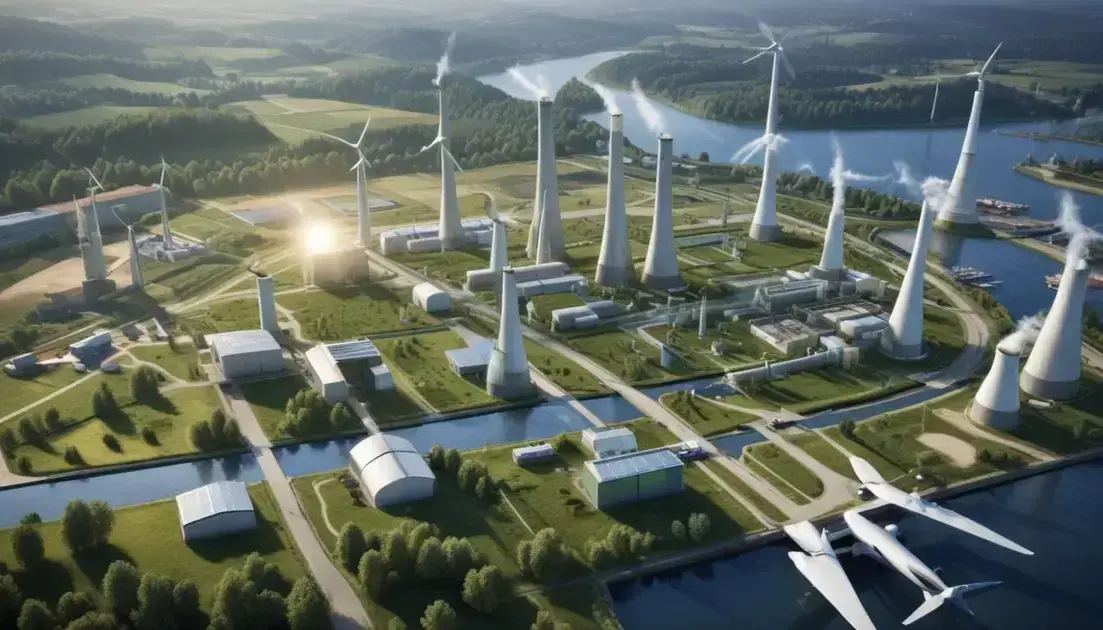How Europe’s Clean Industrial Deal Drives Sustainability
The Clean Industrial Deal aims to enhance sustainability in Europe by promoting green technologies, supporting local production, and facilitating financial investments to help industries achieve climate neutrality by 2050.
The **Clean Industrial Deal** is reshaping how Europe approach sustainability and industrial competitiveness. Curious about its impact? Let’s explore!
Introduction to the Clean Industrial Deal
The Clean Industrial Deal is a significant initiative aimed at enhancing the sustainability of European industries. It serves as a roadmap for integrating green technologies and practices across various sectors. By emphasizing innovation, this deal encourages companies to adopt cleaner manufacturing processes and reduce their carbon footprint, aligning with the EU’s climate goals.
One notable aspect of the Clean Industrial Deal is the commitment to establish the European Industrial Decarbonisation Bank. This institution will provide financial support to businesses transitioning to low-carbon technologies. By facilitating investments in clean energy, the bank aims to bolster economic growth while protecting the environment.
Furthermore, the deal outlines ambitious targets for achieving net-zero emissions by 2050. Industries will be incentivized to invest in renewable energy sources and implement energy-efficient practices. The approach fosters collaboration among stakeholders to drive sustainable change, making it a pivotal part of Europe’s green transition.
Goals of the EU for 2050
The EU’s goals for 2050 are ambitious, aiming for climate neutrality across all member states. The focus is on reducing greenhouse gas emissions significantly, with a target of at least 55% reduction by 2030 compared to 1990 levels. This is a critical step towards achieving a sustainable and resilient economy.
To reach these targets, the EU encourages a deep transformation in energy systems. This involves transitioning to renewable energy sources such as wind, solar, and hydropower. Additionally, investment in energy efficiency is crucial, enhancing buildings and transportation systems to minimize energy consumption.
Moreover, the adoption of green technologies plays a vital role in the EU’s long-term strategy. Innovations in carbon capture, storage, and the development of sustainable industrial practices are prioritized to ensure a smooth transition to a low-carbon economy.
The EU plans to integrate all sectors, including transport, agriculture, and industry, into its climate strategy. Policy measures such as carbon pricing and environmentally friendly regulations will drive the necessary changes, aiming for a balanced approach that also fosters economic growth.
Affordable Energy Action Plan
The Affordable Energy Action Plan is a pivotal component of the EU’s strategy to promote sustainable energy practices. This plan aims to ensure that energy remains accessible and affordable for all citizens while transitioning to greener energy sources. It emphasizes the need for investments in renewable energy infrastructures, such as wind and solar power, which are essential for reducing reliance on fossil fuels.
Crucially, this action plan also includes measures to enhance energy efficiency across various sectors. By optimizing energy use in homes, industries, and transportation, substantial savings can be achieved. The plan encourages the adoption of energy-saving technologies and practices that not only lower costs but also contribute to the reduction of greenhouse gas emissions.
Moreover, the Affordable Energy Action Plan highlights the role of financing in facilitating this transition. It proposes innovative funding mechanisms to encourage both public and private investments in sustainable energy projects. This approach fosters an inclusive energy market, removing barriers and enabling all stakeholders to participate.
As part of the plan, educational initiatives will be launched to inform citizens about energy efficiency. Increased awareness will lead to more conscious energy consumption, steering society towards a sustainable future.
Role of the European Industrial Decarbonisation Bank
The European Industrial Decarbonisation Bank plays a critical role in the EU’s strategy to achieve climate neutrality. Established to support industries in their transition towards low-carbon operations, this financial institution aims to facilitate significant investments in clean technologies and sustainable practices.
One of the bank’s primary objectives is to provide accessible financing solutions for companies looking to invest in renewable energy sources and improve energy efficiency. This support is essential for stimulating research and development of innovative solutions that reduce greenhouse gas emissions.
Furthermore, the decarbonisation bank aims to foster collaboration among various stakeholders, including governments, private sectors, and research institutions. By bringing together these entities, it creates a comprehensive ecosystem focused on sustainable industrial growth.
The bank also emphasizes the importance of job creation within the green economy. It provides funding not just for technologies but also for training programs that prepare the workforce for new, sustainable roles in industries adapting to decarbonisation.
By leveraging public and private investments, the European Industrial Decarbonisation Bank seeks to accelerate the EU’s transition to a low-carbon economy while ensuring that industries remain competitive in a rapidly changing global market.
Policies to Promote Local Production
Policies to Promote Local Production are essential for driving economic growth and enhancing sustainability within the EU. These initiatives aim to strengthen local industries and reduce dependency on imports, thereby bolstering the circular economy. By focusing on local production, the EU ensures that businesses are more resilient to global supply chain disruptions.
A key aspect of these policies is providing financial incentives to manufacturers who prioritize sustainable practices. This includes grants and low-interest loans aimed at facilitating the adoption of clean technologies and improving energy efficiency. Such support not only drives innovation but also contributes to reducing carbon emissions.
Additionally, the promotion of local production fosters job creation within communities. By investing in local supply chains, the EU encourages skills development and workforce training, ensuring that workers are equipped to meet the demands of a green economy. This approach not only boosts local job markets but also enhances overall community resilience.
Moreover, local production policies often include regulations that support sustainable sourcing of materials. This means that companies are encouraged to source raw materials from within the EU, which further strengthens economic ties between member states and reduces transportation emissions.
Strategic Implications for Industries
The strategic implications for industries involved in the Clean Industrial Deal are profound and far-reaching. As companies transition towards sustainable practices, they must adapt their business models to align with new environmental regulations and consumer expectations. This shift not only presents challenges but also creates significant opportunities for growth.
Industries are encouraged to invest in green technologies, which can enhance efficiency and lower operational costs. By implementing sustainable practices, companies will be better positioned to compete in an increasingly eco-conscious market. This includes leveraging renewable energy sources and adopting circular economy principles to minimize waste and resource consumption.
Additionally, as part of the transition, businesses must engage in strategic partnerships and collaborations. This collaborative approach allows industries to share knowledge, resources, and innovations, creating synergies that drive further advancements in sustainability.
The regulatory landscape will also evolve, requiring industries to stay agile and compliant. Companies that proactively embrace these changes are likely to enhance their brand reputation and capture new markets that prioritize sustainability.
Ultimately, the strategic implications of the Clean Industrial Deal encourage industries to rethink their value propositions and innovate, paving the way for a more sustainable and competitive future.
In summary, embracing the Clean Industrial Deal is crucial for a sustainable future
As industries adapt to new environmental standards, the focus on renewable energy and green technologies becomes more important. By investing in these areas, companies can reduce their carbon footprints and enhance their competitive edge.
Collaboration between businesses, governments, and communities is key to achieving success in this transition. Together, they can share resources and knowledge, fostering innovative solutions that support sustainability.
Ultimately, the journey towards a greener economy presents both challenges and opportunities. By acting now and prioritizing sustainable practices, industries can help shape a better future for all.
People Also Ask
What is the Clean Industrial Deal?
The Clean Industrial Deal is an initiative by the EU aimed at promoting sustainable industrial practices and reducing carbon emissions across various sectors.
How can industries benefit from investing in green technologies?
Investing in green technologies can help industries lower operational costs, enhance efficiency, and improve their sustainability, all of which can lead to a competitive advantage.
What role does the European Industrial Decarbonisation Bank play?
The European Industrial Decarbonisation Bank provides financial support to industries transitioning to low-carbon technology, helping facilitate investments in sustainable practices.
Why is local production important for sustainability?
Local production reduces dependency on imports, strengthens supply chains, and minimizes transportation emissions, contributing to a more resilient and sustainable economy.
How do collaboration and partnerships aid in the Clean Industrial Deal?
Collaboration between businesses, governments, and communities fosters knowledge sharing and resource pooling, which can drive innovation and enhance sustainability efforts.
What are the strategic implications of the Clean Industrial Deal for businesses?
Businesses must adapt their models to comply with environmental regulations while also seizing opportunities to innovate and grow in the sustainable market.






